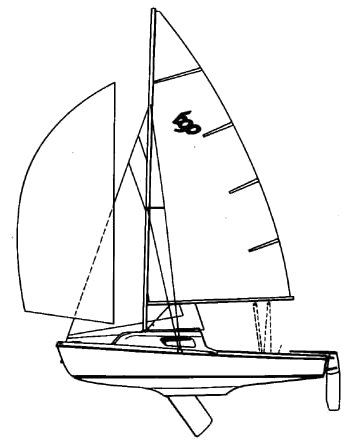The Lanaverre 590 is a distinct small sailboat that skillfully blends the attributes of a performance dinghy with the modest comforts of a pocket cruiser. Measuring just under 20 feet in length, this fractional sloop, introduced in 1963 by the renowned French builder Lanaverre, was conceived to offer both exhilarating racing capabilities and enjoyable family sailing experiences. Designed by the collaborative talents of Christian Maury and François Sergent, the 590 embodies the innovative fiberglass construction ethos that Lanaverre pioneered, reflecting the company's commitment to making sailing accessible and exciting for a broad audience.
590 (Lanaverre) Information, Review, Specs

- Make
- Lanaverre
- Model
- 590
- Number Built
- 2000
- Production Year(s)
- 1963 - ??
History and Design
Lanaverre, founded in 1944 and truly flourishing from 1955 under the partnership of Lucien Lanaverre and Christian Maury, quickly became a leader in the adoption of Glass Reinforced Plastic (GRP) for boat construction. This transition from traditional wood allowed for mass production, reduced maintenance, and consistent performance, characteristics that defined the era in which the 590 was introduced. The 590's production commenced in 1963, a period when Lanaverre was gaining international recognition for its high-quality, performance-oriented boats, most notably the iconic 420 dinghy.
The Lanaverre 590 was designed by both Christian Maury, known for his visionary contributions to Lanaverre's most successful models like the 420, and François Sergent. The design aimed to create a boat that was both elegant and exceptionally pleasant to sail, offering a balance between sporty performance and the practicality of a small cruiser. While there is no specific end year for its production listed in the primary data, the moulds were eventually sold to Brunet France, which produced an updated version, indicating a continued legacy beyond Lanaverre's independent operation which ceased in 1976.
Sailing Performance and Handling
As a light, fractional sloop with a centerboard keel, the Lanaverre 590 is recognized for its lively sailing characteristics. Its design as a "deriseur lesté" (weighted dinghy) or "mini croiseur" (mini cruiser) suggests a responsive and engaging experience on the water. Owners and reviewers often describe the 590 as offering "fast performance" and a "surprising potential" for a boat of its size, capable of "wild planing." The centerboard keel design provides versatility, allowing the boat to navigate both coastal and inland waters with ease, offering a minimum draft of 1.64 feet and a maximum draft of 4.1 feet when the board is deployed. The ability to carry one trapeze for one-design racing further underscores its performance aspirations.
Accommodations and Layout
Given its compact size, the Lanaverre 590 offers basic but functional accommodations, aiming to provide a degree of comfort for day sailing and short cruises. Interior descriptions, though limited in detail in standard specifications, suggest a layout with a surprising amount of volume forward. While a dedicated maximum headroom figure is not available, such a small "pocket cruiser" would typically feature a V-berth forward, perhaps with rudimentary galley facilities and a small head area, intended for minimalist overnighting rather than extended cruising. Lanaverre's reputation for fiberglass construction would suggest a simple, robust interior finish, focused on practicality and durability, in keeping with its dinghy heritage. Owner forums and historical reviews would be the best source for detailed interior insights, often highlighting the modifications and improvements owners have made to maximize its liveability.
Owner's Perspectives
Owners of the Lanaverre 590 frequently praise its solid construction and its ability to deliver an enjoyable sailing experience that combines the agility of a dinghy with the stability of a small cruiser. The boat's versatility as both a family day sailor and a competitive club racer is a common theme in owner feedback. The strong community around the Lanaverre 590, evidenced by active associations and online forums, points to a loyal following who appreciate its design and performance. While specific common problems are not widely documented, general maintenance issues for boats of this vintage often revolve around the wear and tear of original fittings and the need for periodic structural inspections, particularly where the deck and hull join, as noted in discussions about refurbishing older models. The enduring presence of these boats on the water, some undergoing extensive refurbishment, speaks to their robust build quality and the enthusiasm of their owners.
Measurements
Construction & Hull
- Construction Material
- Fiberglass (Solid)
- Hull Type
- Monohull Sailboat
- Keel Type
- Centerboard
- Rudder
- 1x —
- Ballast
- 309 lbs
- Displacement
- 1213 lbs
- Water Capacity
- -
- Fuel Capacity
- -
Engine
- Engine Make
- —
- Engine Model
- —
- Engine Type
- —
- Engine HP
- —
- Engine Count
- 1
- Drive Type
- —
- Fuel Type
- —
Rig & Sails
- Rig Type
- Fractional Sloop
- P (Main Luff)
- -
- E (Main Foot)
- -
- I (Foretriangle Height)
- -
- J (Foretriangle Base)
- -
- Forestay Length (est)
- -
- Main Sail Area
- -
- Foretriangle Sail Area
- -
- Total Sail Area (Reported)
- 185 sqft
- Total Sail Area (Calc)
- -
Dimensions
- LOA
- 19.52 ft
- LWL
- -
- Beam
- 6.73 ft
- Draft
- 4.1 ft
- Max Headroom
- -
- Air Draft
- -
Calculations
- Hull Speed
- — kn
- Pounds per Inch Immersion
- —